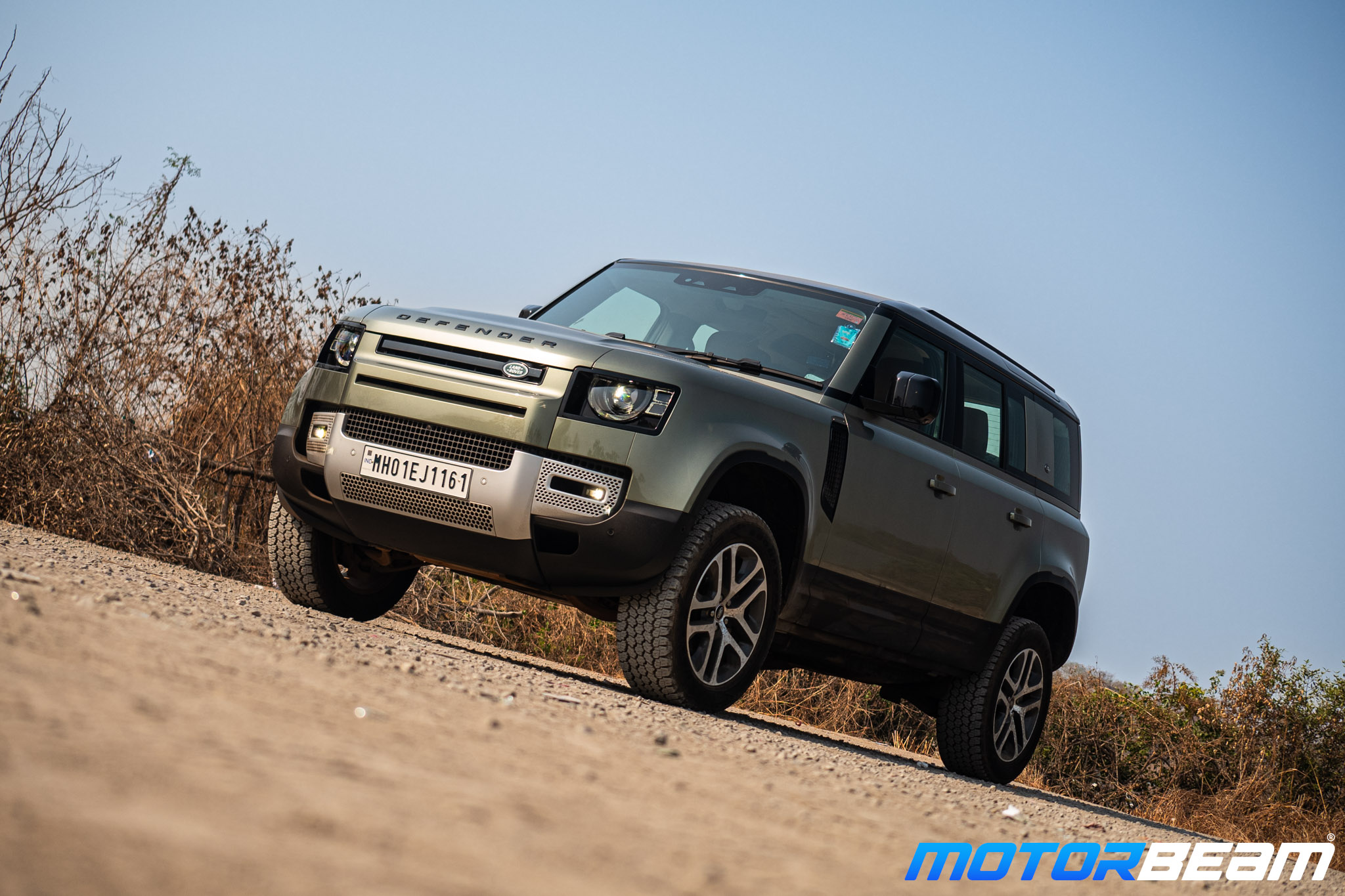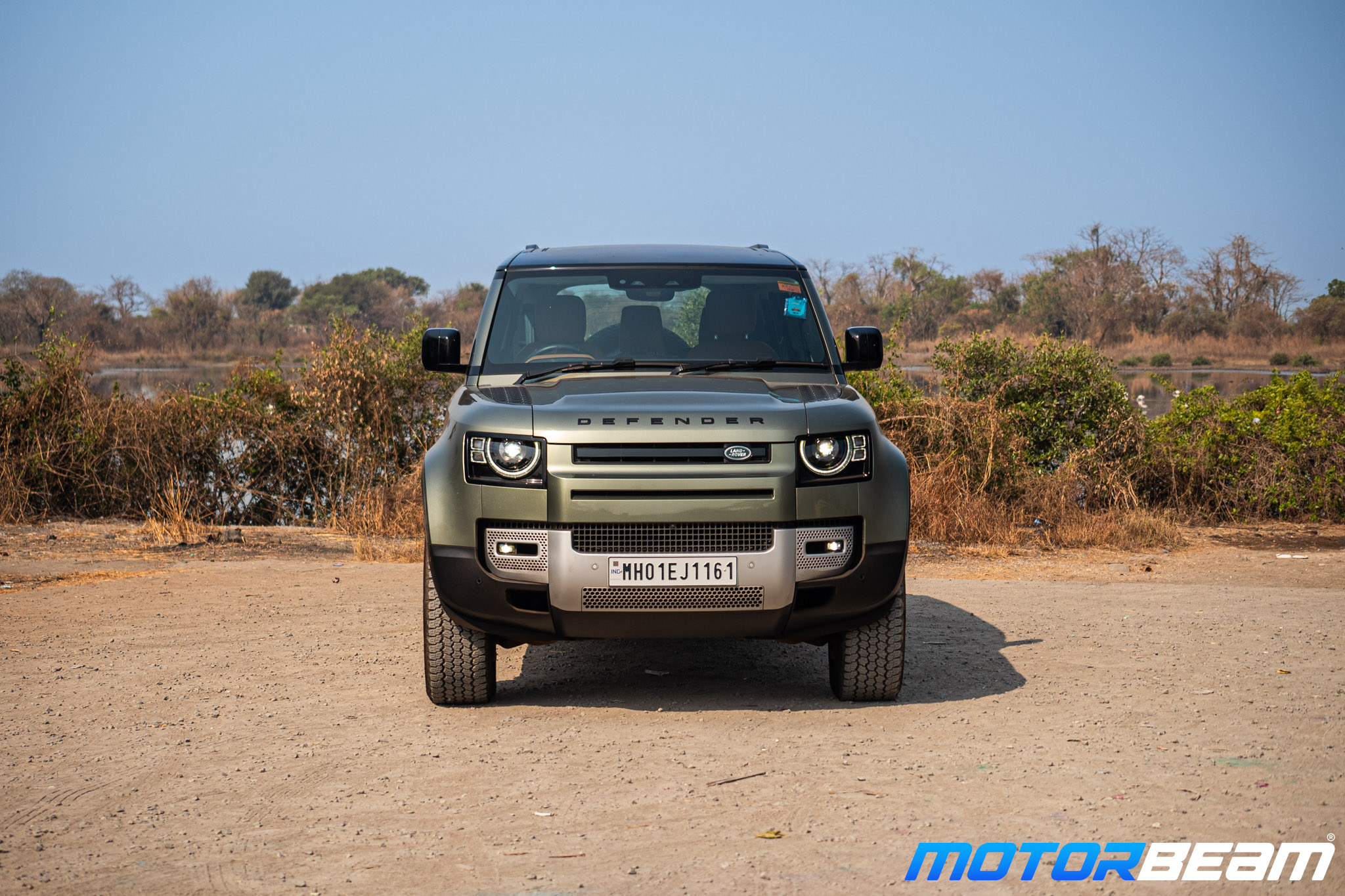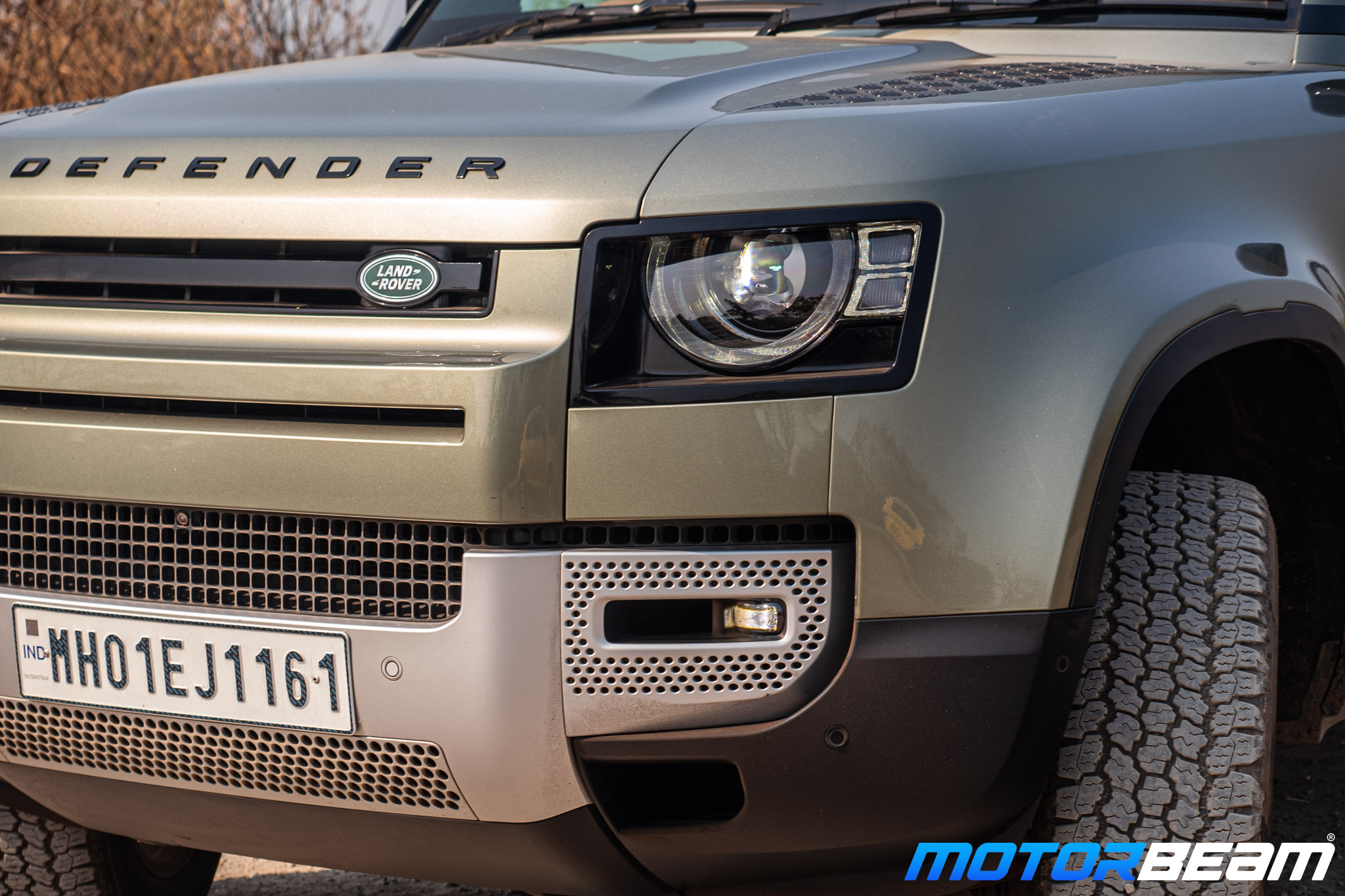
The Defender is the top-selling Land Rover in India, recording over 50 percent year-on-year growth in sales this year. While the Defender 110 is the best-selling model, it is also available in 90 (3-door, short wheelbase) and 130 (long wheelbase) versions. It is the only SUV in their portfolio imported as a CBU, while all others are CKD. Imagine the desirability factor when the Defender is assembled locally in India with CKD kits and a more affordable price tag.

Why is it the best seller? Well, one of the biggest reasons, in my opinion, is that it looks very different from its competitors in this price bracket. The Defender has a unique stance, standing tall and confident with a rugged, stylish appeal that instantly catches attention. Its large dimensions and retro styling amplify its road presence.

The Defender features a long hood with bold “Defender” lettering on the nose, neatly stacked square headlamps, a clean grille design and a rugged bumper with LED fog lamps integrated into the mesh grille. The side profile is defined by large square wheel arches and smart-looking alloys, with options available for those seeking customisation. The alloys on our test car look simple and neat.
From the side profile, it looks like a building on wheels. The Defender has a ground clearance of 218 mm, which can be increased by a whopping 70 mm for off-roading. I love the rear profile, which has a tank-like stance. It features a flat tail, curves along the waistline and a tailgate-mounted spare wheel that enhances its rugged appeal. The square tail lights on the black panel, along with smaller square turn indicator lights, add to the drama.
The interior is offbeat as well, matching the unique character of the exterior. It has a neat layout that combines a minimalistic look with rugged appeal. The dashboard has a chunky, dual-tone layered arrangement with AC vents positioned on top. Two parallel lines with soft-touch materials and stitching run across the dash, with the sizable touchscreen infotainment neatly placed between them. Behind the chunky, four-spoke steering wheel, there’s a kink to accommodate the digital-analog instrument cluster.
The 11.4-inch touchscreen infotainment system has a user-friendly UI with high-resolution graphics. It features a clear 360-degree camera display, which is useful in tight parking situations and during off-roading. It also offers wireless Apple CarPlay and Android Auto. The Defender is equipped with a Meridian audio system, providing an excellent sound experience. Additionally, the 10-colour ambient lighting enhances the premium feel of the interior.
I love that Land Rover still offers the digital-analog cluster, retaining the old-school SUV charm. The floating center console houses the gear selector lever, which looks impressive. It also features the engine start/stop button, a volume control knob and a few buttons for climate control settings and off-road modes.
The Defender’s seats are very comfortable and supportive, with both heating and ventilation options, making them perfect for long drives and extended hours in city traffic. You sit high up, with a commanding driving position. The visible bonnet line and extensive glass area all around provide top-notch visibility. After driving the new Range Rover, I felt that the Defender’s driving position is even more commanding. However, getting in and out from that height isn’t very easy for shorter individuals unless side steps are added. There’s an option to lower the ride height for easier entry and exit but it’s still relatively high for kids and elderly passengers.
The rear seats are also comfortable, with ample headroom and a large glass area that feels airy. However, legroom is relatively limited, given the size of the Defender. Three people can sit comfortably across, though the middle passenger has less under-thigh support, firmer cushioning for the back and must manage with a floor hump. Rear passengers also benefit from two-zone climate control, adjustable via the center console switches.
The Defender’s boot space is ample, with a 786-litre capacity. The boot area is finished with a material that’s easy to clean and wipe down if it gets dirty. Accessing the boot, given its height, can be challenging, so Land Rover has provided buttons in the boot to lower the height for easier loading. A third-row seating option is also available, best suited for kids. When the third row is folded down, it offers 743 litres of boot space.
We got the Land Rover Defender HSE, powered by the P300 2.0-litre 4-cylinder engine. This engine produces 300 PS and 400 Nm of torque. Despite the SUV’s hefty unladen weight of 2268 kg, it goes from 0-100 km/hr in 7.4 seconds, which is quite respectable. There’s some initial lag when accelerating from a standstill but it becomes more linear as you push through the rev range, delivering stronger acceleration as it gains momentum.
On highways, it cruises effortlessly with mild throttle inputs but in stop-and-go traffic, it takes some getting used to the throttle range to manage the initial lag. The engine feels very refined and smooth, even at high revs, it doesn’t sound coarse, instead offering a sportier note further up the rev range.
This engine is paired with a smooth-shifting 8-speed automatic transmission. Gear changes are seamless, with no jerks or pauses and downshifts are equally smooth. During overtakes, you may need to press the throttle deeper to prompt a quick downshift but otherwise, you can ride the torque curve sedately to get this SUV moving. It delivers around 7-8 km/l of fuel efficiency in mixed driving conditions, which is decent for a large SUV.
The Defender is based on a monocoque platform, which provides a noticeable difference compared to a top-heavy, ladder-frame SUV of this size. Its driving dynamics are relatively nimble. You can make quick lane changes without any drama and even hard cornering maintains your confidence. While there is some body roll and nose dive when braking hard, it’s well controlled thanks to the air suspension. The steering is light at low speeds, which is great for city driving and it weighs up nicely at high speeds. However, it’s not particularly rich in feedback.
The ride quality is excellent, keeping passengers comfortable over bumps, potholes and rough roads. High-speed stability is also commendable, feeling rock-solid at triple-digit speeds. NVH levels are well managed at high speeds, so you aren’t disturbed by wind or tyre noise on highways.
For off-road duties, the Defender is well-equipped with all-terrain tyres, a generous ground clearance of 293 mm at max ride height and a water-wading capacity of 900 mm. Whether you’re heading to a farmhouse over rough terrain or navigating waterlogged city streets, the Defender keeps you comfortable and confident. It also features the capable Terrain Response system, complete with proper 4×4 hardware and a low-range mode, making it adept at tackling various terrain conditions, including snow, sand, mud and rocks.
The Land Rover Defender’s price ranges from Rs. 1.20 crores to Rs. 3.28 crores (on-road Mumbai). It is available with a 2.0-litre petrol, 3.0-litre petrol, 3.0-litre diesel and a 4.4-litre V8 petrol engine. I believe the most value-for-money version is the one we drove, the HSE P300, which offers a great package for Rs. 1.20 crores. We hope Land Rover considers assembling it locally to make it more affordable for a wider audience. At this price point, you’ll hardly find an SUV as capable and unique as the Defender but if you prefer luxury-oriented, reliable SUVs over rugged ones you could consider options like the Mercedes GLE, BMW X5, Audi Q7 and Volvo XC90.




